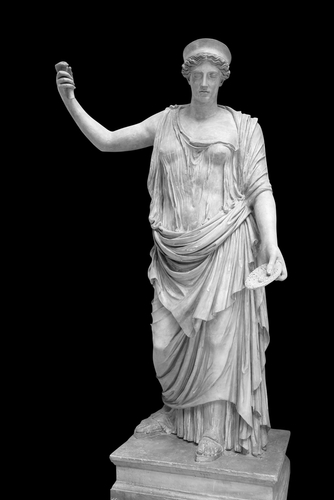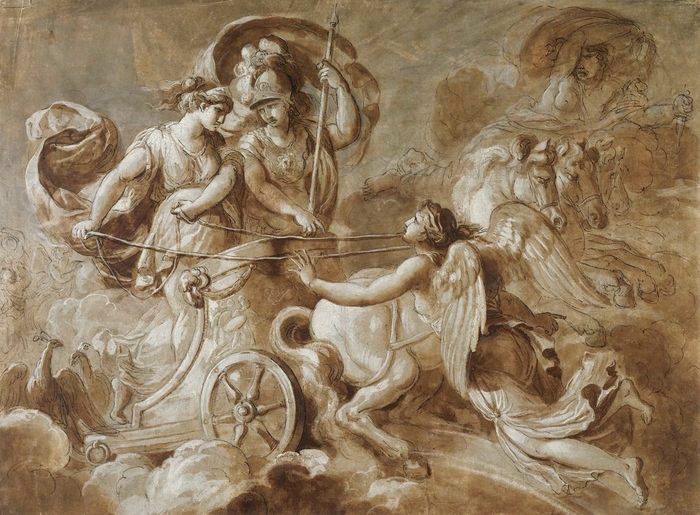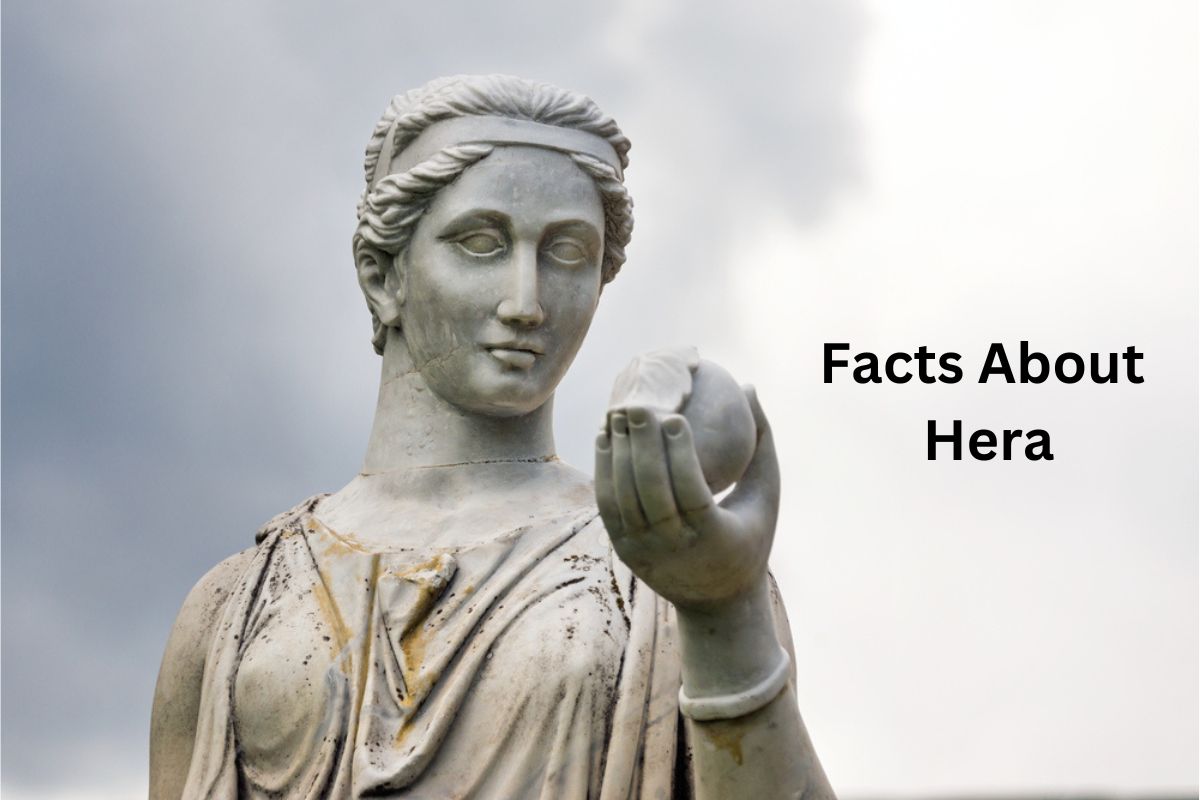Hera is an ancient Greek goddess and a member of the Twelve Olympians. She holds the prestigious position of queen of the gods and is the wife and sister of Zeus.
Hera is closely associated with marriage, family, and childbirth, embodying the ideals of marital fidelity and the protection of familial bonds.
While known for her jealousy and vindictiveness towards Zeus’ infidelities, Hera is also revered as a protector of women and is often invoked for blessings in marriage and assistance during childbirth.
She is symbolically represented by peacocks and cows, and her worship was centered around the Heraion, a grand temple in Argos. Hera’s counterpart in Roman mythology is Juno, and she played a significant role in the Trojan War, supporting the Greek cause.
Hera Facts
1. Greek goddess and one of the Twelve Olympians
In ancient Greek mythology, Hera holds a prominent position among the gods and goddesses as one of the Twelve Olympians.
These twelve deities were considered the principal gods of the Greek pantheon and resided on Mount Olympus.
Also Read: Hermes Facts
Hera’s position as one of the Olympians highlights her importance and influence within Greek mythology.

2. Queen of the gods, wife, and sister of Zeus
Hera is most famously known as the queen of the gods and the wife of Zeus, the king of the gods. However, their relationship is complex as Hera is also Zeus’ sister.
Also Read: Facts About Apollo
Their marriage represents the union between heaven and earth, and their divine partnership holds a significant place in Greek mythology.
3. Associated with marriage, family, and childbirth
Hera is primarily associated with concepts related to marriage, family, and childbirth. As the goddess of marriage, she embodies the ideals of marital fidelity, commitment, and the sacred bond between spouses. Hera is often invoked by couples seeking blessings for their union and protection for their family.
Additionally, she is linked to childbirth and oversees the well-being of women during pregnancy and labor, offering support and guidance for safe deliveries. These aspects of Hera’s domain demonstrate her role as a protector and guardian of the fundamental aspects of human life.
4. Known for her jealousy and vindictiveness
Hera is often depicted as a goddess with a strong sense of jealousy and a vengeful nature, particularly towards Zeus’ numerous infidelities. Her jealousy stems from Zeus’ constant affairs and the children he sires with other goddesses, nymphs, and mortal women.
As a result, Hera often takes revenge on Zeus’ lovers and their offspring, subjecting them to her wrath and ensuring they face challenges and hardships.
This aspect of Hera’s personality showcases her complex emotions and highlights her determination to protect her position as the queen of the gods.

5. Mother of Ares, Hebe, and Hephaestus
Hera is a mother to several prominent deities in Greek mythology. She is the mother of Ares, the god of war, who embodies the fierce and violent aspects of conflict. Hebe, the goddess of youth and cupbearer of the gods, is also Hera’s daughter.
Additionally, Hera is the mother of Hephaestus, the god of fire, metalworking, and craftsmanship. Hephaestus is known for his skilled craftsmanship and his role as the blacksmith of the gods.
However, Hera’s relationship with Hephaestus is complex, as she either rejected or abandoned him due to his deformities, leading to his eventual estrangement from the other gods.
6. Sacred animals: peacocks and cows
Hera is closely associated with two sacred animals—the peacock and the cow. Peacocks are often depicted as symbols of Hera’s regality, beauty, and majesty.
The vibrant and mesmerizing feathers of the peacock are seen as representations of her divine presence. Additionally, cows are associated with Hera, symbolizing her nurturing and motherly nature.
The cow is a creature often associated with fertility, abundance, and the caring aspects of motherhood. These animals serve as important symbols connected to Hera and further emphasize her divine attributes and qualities.
7. Heraion, a famous temple dedicated to her in Argos
The Heraion, located in Argos, Greece, was a renowned temple dedicated to the worship of Hera. It was one of the largest and oldest temples in Greece, serving as a significant center for her cult.
The Heraion attracted devotees from various regions who sought to honor and pay homage to the goddess. The temple’s grandeur and historical significance reflect the importance of Hera within the religious and cultural landscape of ancient Greece.
8. Roman counterpart: Juno
In Roman mythology, Hera’s equivalent deity is Juno. Juno shares many similarities with Hera in terms of her role as the queen of the gods and her association with marriage, family, and childbirth.
However, there are subtle differences in their stories and attributes, influenced by the distinct cultural and religious contexts of ancient Greece and Rome. Juno is regarded as one of the most significant Roman goddesses and plays a prominent role in Roman mythology.
9. Played a significant role in the Trojan War
Hera had a significant involvement in the events of the Trojan War, an epic conflict between the Greeks and the Trojans. She was a staunch supporter of the Greeks and used her influence and power to aid their cause.
Hera’s actions included influencing other gods and manipulating events on the battlefield to ensure the defeat of the Trojans. Her motivations were rooted in her long-standing grudge against Paris, who had declared Aphrodite as the most beautiful goddess over Hera and Athena.
10. Associated with women’s protection, marriage, and fertility
Beyond her role as queen of the gods and her involvement in mythical events, Hera is closely associated with the well-being and protection of women. As the goddess of marriage, she oversees the institution of marriage and is invoked for blessings, fidelity, and the preservation of marital harmony.
Women would seek her assistance for safe childbirth and fertility, believing in her power to aid them in these vital aspects of their lives. Hera’s association with women’s welfare further solidifies her significance as a maternal and protective deity within the Greek pantheon.
